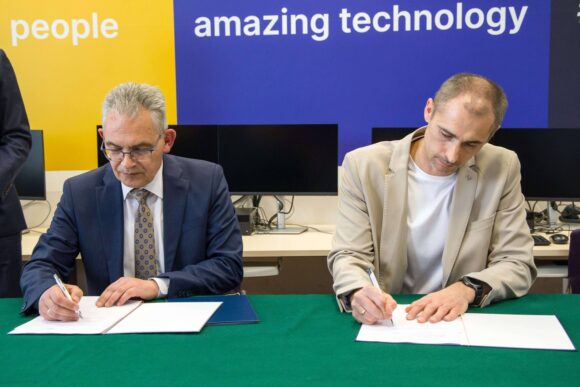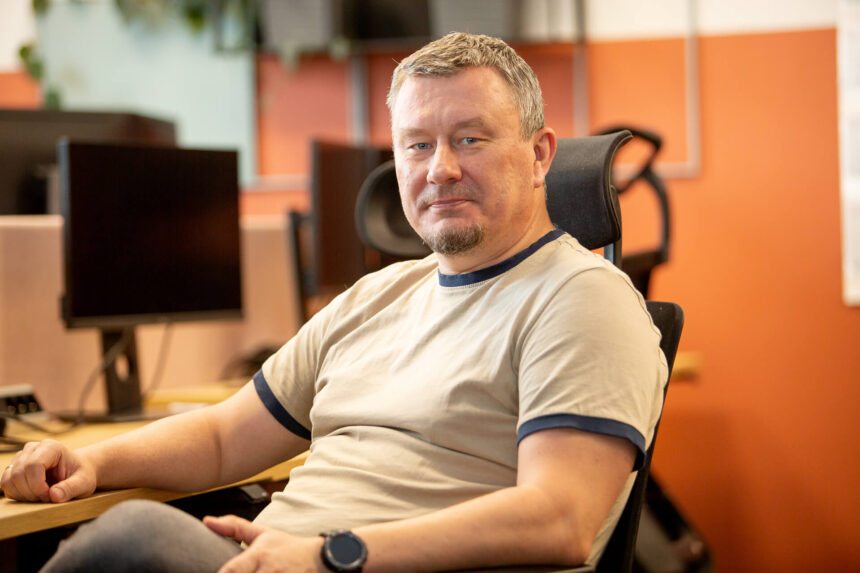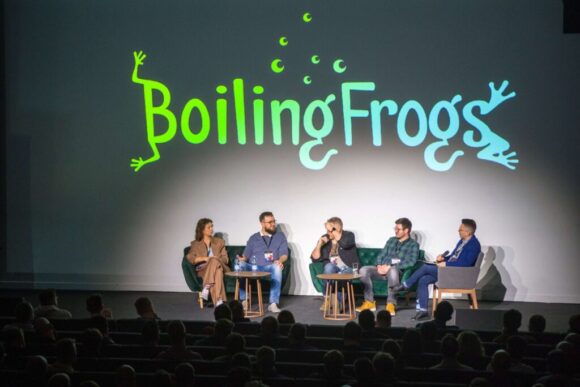
What keeps me at AUCTANE? The atmosphere! – An interview with Witek, Support Manager

It has just been 5 years since Witek joined our team as Senior Customer Support Manager. Although he has a lot on his plate, we managed to squeeze a few questions into his busy schedule. He told us what his time at AUCTANE has been like, what exactly his role involves and what challenges our amazing support team faces. Want to know more about the work of this demanding department? We invite you to read on.
Witek, we would like to start by asking you to look back 5 years. Tell us how your adventure with AUCTANE began.
My adventure with AUCTANE started with managing the support for our platform in Poland. Since then, my role as Support Manager has not changed, but the areas we support have evolved. Initially we focused on the Polish platform, over time we became involved in supporting our UK platform, and then we took on support for more platforms from the US.
That’s the beauty of the role – it’s not a static position where you do the same thing every day. We are kept up to date with new challenges, clients and areas, which is undoubtedly very rewarding. I’ve been Support Manager for 5 years, but in reality my role is constantly evolving as our team grows and takes on more ‘toys’. Yes, there really is a lot going on! (laughs).
What experience did you bring to AUCTANE?
My whole professional life has been related to logistics. I spent many years in the automotive industry in various roles – from coordinating and ordering automotive parts, to managing planning and customer service, to supply chain manager. The latter role, which was in a different industry, involved managing the entire logistics spectrum – from inbound and outbound processes to internal logistics and purchasing. But I was always drawn to the idea of direct customer contact. So I went in that direction and started working in the IT industry, where I was specifically responsible for customer service.
It wasn’t long before my career paths converged at AUCTANE, where I now oversee all technical support, customer support and problem solving. I often say that the most important aspect of our job is “bringing the customer back to life”. – When a customer has a problem, we do everything we can to get them back up and running. Sometimes the methods may seem a little unconventional, but the end result is the most important thing (laughs). We put the fire out first. Then we can keep on tweaking to make everything run like clockwork.
What were the circumstances that led you to join AUCTANE? Did you know right away that this was the place for you?
I came to AUCTANE thanks to a headhunter. I knew that the company was looking for a Support Manager and as I live in Zielona Góra, not far from the company’s headquarters, I arranged a meeting. After several interviews and meetings with the team, I found myself here and I have never regretted this decision.
Hopefully it was more than just the convenient location that convinced you (laughs)?
I’ll be honest and say that what convinced me about AUCTANE is something I experience all the time: the atmosphere. Both within the company and within the team. There is no ‘rat race’ here. Admittedly, we have an inside joke: “Don’t look for support in support”. But the truth is that if someone needs support or help, they will always get it. No one is ever left alone with a problem, no matter how complex. This atmosphere, the team chemistry, the common goals – it all makes it a very special place to work.
On the other hand, working in Customer Service is challenging. Every day brings new projects, new areas to explore, new ‘toys’ to learn. This is great because it allows you to develop in almost every direction. As a support department, we touch every aspect of the business. We don’t always go into every detail, but we are exposed to every aspect – from databases, to AWS, to code, to configurations, to anything that could cause problems or potential incidents.
AUCTANE uses the latest technology – we’re not talking about servers hidden under a desk, we’re talking about the latest solutions on the market. Anyone who joins our department has the opportunity to learn all these technologies. Support is really a stepping stone from which you can move on – and often do. The people who work here for 2, 3, 4 years are often young people, just out of university, who say: ‘I’m going to be a developer one day’. And indeed, some of them have become developers, but for the most part they choose other areas, they become project managers, business analysts, testers or DevOps specialists. By working in support, such a person has the opportunity to explore many different areas and decide what they are really passionate about, what they are most attracted to. And my role is to help them pursue that direction. That is the most rewarding part of it all. Watching these people grow, watching their careers change, I can’t help but be proud. It is truly rewarding.
Support is a unique department. It requires communication skills, the ability to cope with stress and technical expertise. In your opinion, what is the ideal candidate for this position? What skills should he or she have?
He or she should definitely have a solid IT background, including an understanding of coding. I’m not talking about expertise in writing code, but the ability to interpret it. Knowledge of SQL would also be useful. However, a key characteristic is an open and analytical approach to problems. Mentality is key in all of this – you can be technically proficient, but you also need to be able to put the facts together. Working in support is about being able to put together seemingly loose pieces, to put the jigsaw together to identify the problem – the root cause, the real reason for a situation.
Above all, it requires a willingness to learn. There is no denying that learning by doing plays an important role in Support. When you join, you get a mentor – a shadow who is always at your side, inspiring you to learn, to take on new tasks, to resolve incidents. The mentor’s role is not to give you ready-made solutions, but to guide you through a problem. So that the next time you face a similar challenge, you can deal with it yourself without having to ask for help. There is also a whole library of articles available – our knowledge base, created by the support team, where you can do your own reading on recurring topics.
Also read: Changes create opportunities. An interview with Paweł, Solution Architect
Of course, resilience to stress is important, but it is the mind that counts. Openness to new knowledge is key because, as I said, there is a lot of it. New products come out, there is always something new to learn, sometimes similar to concepts you have learned before, sometimes completely different. Then there’s the geographical complexity – from servicing the Polish platform, to the UK platform, to the US platform. So being open to new things, to diversity, to processes and automation is essential.
So if you are a person who is curious, open to learning and keen to develop your technical skills, the Support department could be the perfect place for you. Not only will you gain valuable technical knowledge, but you will also have the opportunity to develop soft skills such as stress management, communication and quick problem solving.
And you manage the whole department. Tell us about your work as a department manager.
We work in a team of 17, but it’s growing all the time. There are also a few people from the UK. My role is complex. It’s not just about managing people and processes, it’s also about strategy, planning and making sure my team has everything they need to do their job effectively and efficiently. This means that I have to be well versed in all aspects of our department. I also make sure that communication within the team is fluid so that everyone is aware of the key priorities and objectives, as this also helps each individual to better understand where they stand in their role. I am available to my team to help them solve problems, overcome obstacles and steer them in the right direction. This means that if the team encounters an obstacle, a wall, I help them to jump over it, go around it or tear it down. Whichever way we go, we aim to remove that obstacle. We also want to make sure that the same incidents don’t happen again, and that requires us to put more procedures in place, sometimes to better educate customers, couriers or warehouses, where many situations originate.
One of my responsibilities as a manager – and one that gives me great satisfaction – is to ensure that my team is motivated, happy and engaged in their work. Building relationships with the team, understanding their needs and expectations, making sure they feel valued and heard.
Last but not least, ensuring that my team has access to the right tools and resources so that they can continually develop and improve their skills. This means managing training, workshops and other learning opportunities, and ensuring that the latest knowledge and experience is regularly shared between team members.
Czy w tym wszystkim jest miejsce również na odpoczynek i chwilę oddechu?
Najbardziej intensywne miesiące dla działu wsparcia w sektorze e-commerce to listopad i grudzień. To czas, gdy najmniejsze problemy mogą przekształcić się w dużo większe wyzwania ze względu na znacznie większą liczbę transakcji i złożonych zamówień. Dlatego każdego roku, przed tzw. peakiem, organizujemy wspólny Support Trip. Zbieramy cały zespół, wszystkich obecnych i byłych Supportowców i wyruszamy na cały weekend, by odstresować się przed Black Friday, pobawić przy ognisku, pochodzić po górach i wrócić z naładowanymi bateriami.
Na co dzień staramy się również balansować to dodatkowym wsparciem i upewnieniem się, że nikt nie jest przeciążony. Staramy się również promować zdrową równowagę między pracą a życiem osobistym, ponieważ wiemy, jak ważne jest to dla ogólnego dobrostanu i efektywności pracowników. Zapewniamy elastyczne godziny pracy, możliwość pracy zdalnej i kilka innych benefitów, które aktywnie wspierają kondycję psychiczną i fizyczną naszych pracowników.
You talk a lot about team development. Do you take care of your own personal development as well? Do you set yourself goals or career aspirations?
That’s a big part of my personal development – working to make sure we can operate effectively, now as a global unit. At the moment we are moving towards a single global support department covering all our offices around the world. The working model we are developing is called ‘follow the sun’. This means that when it is daylight in a particular part of the world and orders are higher, the relevant department takes over. In short, the idea is that incidents and other tasks are handled by the support departments that currently have their working hours.
This is challenging because it involves managing cultural differences, time zones and different business processes. But it is also exciting and very rewarding because it gives us the opportunity to learn from each other and continuously improve our processes.
So there is constant development, but you also mentioned maintaining a work-life balance. How do you think AUCTANE compares in this respect? What benefits do you get?
Personally, I benefit from the Volunteer Day. I remember one time we managed to get a big group of people from the support department together, we went into the woods and collected a really large amount of rubbish, including washing machines and fridges. I’m glad that we were able to do that and that the company supports us in such initiatives by giving us a day off to do just that. I also make good use of my sports card, going to the swimming pool, gym and squash.
I also enjoy all kinds of internal events, which are quite regular at AUCTANE. Recently, for example, there have been business meetings called Meet&Eat, where we talk about technology and where things are going over refreshments. And of course the Summer Party (laughs). Interesting fact: my first day at AUCTANE was the Summer Party. I hadn’t started work yet and I already had the opportunity to take part in a team-building event. I have to admit that it really captivated me at the time, seeing the team, the whole atmosphere. I remember that there was the painting of the cars in Ochla in the car park. I saw all the people coming together and it was really cool to be able to experience that atmosphere.
My team members also benefit in many ways. There are those who learn a foreign language, those who develop their passions with the AUCTANE Active programme. We also have the best café in town (laughs). Full fridges and snacks, which seems like a small thing, but when you are sitting on a serious problem and your mind is busy, your battery runs out. That’s when you can treat yourself to a dose of caffeine or a snack of some kind. These are small things, but they are important.
You keep coming back to your team in your answers. If so, tell us what you value most about it and what you think are your differentiators.
What I appreciate most is that we are all working towards the same goal. It really shines through and everyone in support understands very well that at the end of every journey we make, there is always the customer. How we reach our goals is a matter of agreement and of course it’s not always easy, there are some differences, but at the end of the day I can be sure that we will reach that consensus together.
I have a motto: “If you take care of your team, your team will take care of your customers”. And it is working here. If you take care of the team, develop the team, then you don’t have to worry about the customer, because they’ll be taken care of and they’ll be happy. I’d like to get that across – it’s not me doing all this, it’s them. I might talk to somebody, I might explain something, but they do all the work with the customers. The whole team is involved, whether it’s the first line of support or the second, more technical line. They work together and act as one big team.
And it shows on the outside too. Lastly, is there a story that stands out in your mind, an anecdote or perhaps a lesson that you have learned as a team?
We have many stories, but there is one phrase that we often recall that sums up the nature of our work perfectly. It was said by a colleague who is now DevOps and spent about three years in support on the second line, the technical line. He once said this famous phrase that still comes up in our conversations: “What do we do when there is nothing to do? Once we’ve sorted out all the incidents, once everything’s sorted out, what are we going to do?
We are very amused by this because, of course, neither I nor my team foresee such a situation. There is always room for improvement, for automation. Yes, the volume of work drops off at times, but then we have time to learn, to develop, to fix the things that were not urgent at the time, but need to be fixed. It gives us a buffer so that we have something to work on.
But that’s the beauty of it. The fact that there are areas that I don’t have to control because the team has already worked that out. When there’s actually less work to do, nobody puts their feet up on the desk, everybody thinks about how to use the time, looks at what’s on the backlog and deals with it. So – what are we going to do if there isn’t, what are we going to do? We will continue to minimise incidents, automate processes and evolve.
